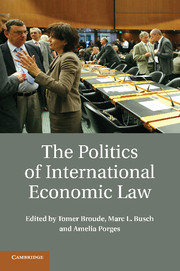Book contents
- Frontmatter
- Contents
- Contributor List
- Acknowledgments
- 1 Introduction
- Part I The Politics of Law Making in International Trade
- Part II The Politics of International Investment Treaty Making
- Part III The Politics of Sovereign Wealth and International Financial Law
- Part IV The Politics of Dispute Settlement in International Economic Law
- 11 Ruling Not to Rule
- 12 The Politics of Competing Jurisdictional Claims in WTO and RTA Disputes
- Part V Linkages between International Economic Law and Foreign Policy
- Index
11 - Ruling Not to Rule
The Use of Judicial Economy by WTO Panels
Published online by Cambridge University Press: 03 May 2011
- Frontmatter
- Contents
- Contributor List
- Acknowledgments
- 1 Introduction
- Part I The Politics of Law Making in International Trade
- Part II The Politics of International Investment Treaty Making
- Part III The Politics of Sovereign Wealth and International Financial Law
- Part IV The Politics of Dispute Settlement in International Economic Law
- 11 Ruling Not to Rule
- 12 The Politics of Competing Jurisdictional Claims in WTO and RTA Disputes
- Part V Linkages between International Economic Law and Foreign Policy
- Index
Summary
INTRODUCTION
Despite the fact that panels at the World Trade Organization (WTO) exercise judicial economy in nearly half their rulings, little has been written on the subject. This is surprising, because judicial economy is the issue-avoidance technique that panels use to avoid ruling on legal claims that they do not regard as being necessary to resolving the dispute at hand. Add to this that there are few hard and fast rules governing its use, and that litigants often appeal the panel's exercise of judicial economy, and we have all the makings of political intrigue. Indeed, observers agree that politics probably has a lot to do with it, though few venture a guess as to why judicial economy is practiced in some contentious cases but not in others. In this chapter, we seek to fill in this gap in the literature. Our argument is that panels exercise judicial economy to limit the scope of the case law that results from their rulings, and they do so because of concerns raised by the wider membership, which has voice through third parties. Specifically, panels take those third parties siding with both the complainant and defendant – offering what we call mixed submissions – as a credible signal of the membership's ambivalence about the scope of a ruling. Bringing data to bear on our argument, we find that an increase in the number of third parties offering mixed submissions increases the odds that the panel exercises judicial economy by as much as 67 percent.
- Type
- Chapter
- Information
- The Politics of International Economic Law , pp. 263 - 281Publisher: Cambridge University PressPrint publication year: 2011
- 1
- Cited by



